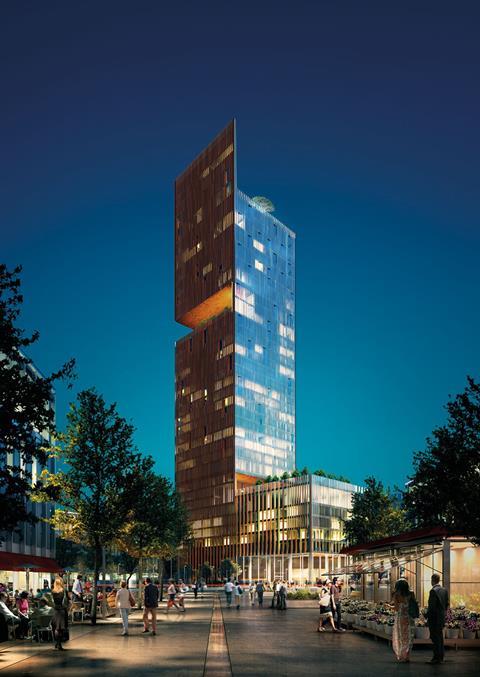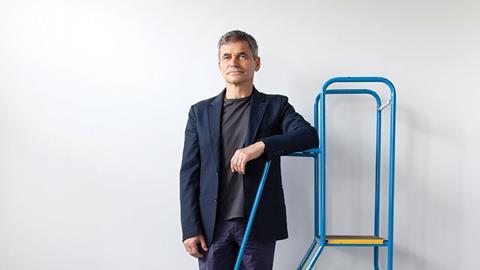Manhattan Loft Corporation’s chief executive on transforming the East End and keeping overseas buyers at bay
Harry Handelsman wants to build the most beautiful building in the Western world - in Stratford, east London.
Even for the developer behind the spectacular restoration of London’s St Pancras hotel, this is ambitious - something he begrudgingly concedes. But his vision for Manhattan Loft Gardens - the £250m 42-storey luxury residential tower planned for next to Queen Elizabeth Olympic Park - has actually been reined in. His original brief to US architect SOM was to design the most beautiful building in the world, but this was scaled back because “the Middle East and Asia are such fast-changing places you almost can’t cope with that”. So he’s going to build the most beautiful building in Europe and North America instead.
If it were any other developer you might call him crazy. But you’d be brave to bet against Handelsman, who has made a habit of proving his doubters wrong. His company Manhattan Loft Corporation (MLC), which he founded in 1992 to develop loft-style apartments and has since expanded into other sectors, has a knack of gambling successfully on schemes and areas, be it King’s Cross, Bankside or Clerkenwell.
Savvy developers and construction companies want to know what MLC is doing next. A lesser firm might have opted for a few quiet years after tackling a behemoth such as St Pancras, not least as Handelsman had to plough in vast sums of his own money - reportedly tens of millions of pounds - and he admits the project took such a personal and financial toll on him that he now wonders whether it was a mistake to do it. But instead MLC is ramping up its development pipeline, which stands at £500m, with a £100m fashion industry and retail development in Hackney, a £40m hotel in north London and a biomass power station in Wales also in train.
Speaking in his stylish fifth-floor Marylebone office overlooking west London, Handelsman sets out the firm’s pipeline in detail and what he’s looking for from potential suppliers, occasionally casually manipulating the chain to his blinds as he talks. He also explains why he’s a “firm believer” in east London, why money doesn’t make him tick and why he won’t be joining the “unhealthy” rush to flog London developments to overseas buyers.
He may have big ambitions, but German-born Handelsman is surprisingly down to earth.
He is dressed down in a black long sleeve t-shirt and boat-style trousers and shoes, which adds to the grounded impression. He speaks in a soft, German-inflected accent, but his demeanour is purposeful. He’s also generally open and engaging, but he is coy, verging on abrupt, when the conversation turns to whether or not his schemes are commercial as well as critical successes. The good news for suppliers is that he also has an open attitude to the supply chain and is always on the lookout for new blood.
A £500m pipeline
It is no accident that MLC’s two largest planned projects in the capital - Manhattan Loft Gardens and the Hackney Fashion Hub - are in the east of the city. Handelsman is convinced that London is experiencing a “shift in the centre of gravity” from west to east, due to the Olympics, improvements in infrastructure and the expected boost from the completion of Crossrail in 2018. He says he likes that east London has more of a mix of uses than the residential-heavy west of the city and has more of a mix of classes, both of which aspects make it “more English”.
Manhattan Loft Gardens will stand at 135m tall - the same height as the London Eye - and consist of 248 private apartments, as well as several facilities open to the public, including a seven-storey hotel, a spa, two restaurants and one of three sky gardens. His aim is to “redefine a high-rise building”, claiming that all other towers are too commoditised and don’t work from a “human” perspective. He says MLC is investing time and money to address this, working closely with SOM to create an “iconic” exterior design, and with a range of interior designers to ensure the internal space is “best utilised”. He admits the process is “very challenging and quite expensive”, but is adamant the project will work commercially, despite the fact that luxury apartments of this standard are unheard of in Stratford, even post-Olympics. Handelsman hopes to sell most of the building’s flats for between £400,000 and £2m, way above the average selling price for apartments in Stratford at just over £200,000.
Handelsman has a wry explanation for why he chose Stratford as the best location for Manhattan Loft Gardens: “The government spent £12bn so I can develop a tower, which I thought was quite generous,” he says cracking a wide grin - a reference to the government’s investment in the adjacent Olympic park and connecting infrastructure.
The government spent £12bn so I can develop a tower, which I thought was quite generous
SOM is now finalising the design and Handelsman hopes to begin sounding out contractors within the next couple of months and for work to start on site early next year. SOM is also the structural engineer and DBK is the quantity surveyor.
The Fashion Hub is no less ambitious. MLC’s target is to transform an unloved part of Hackney town centre into an “international focal point of fashion”. MLC is working with architect David Adjaye to design a mix of retail space and design studios across two warehouse buildings, to be occupied by a mix of local designers and international fashion houses.
Handelsman was initially invited by the property owner to look at the top floor of the warehouses with a view to converting them into apartments, while the ground floor was earmarked for retail. “I said I could do it and make a bit of a profit, but I recommended that what you really should do with the upstairs is give it to local designers to showcase their skills,” he says. “You might not make any money initially but eventually they’ll become quite well known and you’ll do well out of it. He embraced the idea.” He says MLC did a similar thing when it redeveloped Ealing Studios, which now hosts established studios with productions like Downton Abbey, alongside start-ups.

MLC’s goal for the Fashion Hub is to create a “destination” where people go out of curiosity, or for shopping. He saw when living in Bankside during the nineties how a retail destination - Borough Market - could regenerate an area. “Doing this and doing it well could be quite exciting,” he adds.
MLC is waiting on planning approval from Hackney council and plans to develop the project over the next three to four years. Handelsman hopes “tens of thousands of square feet of retail space” will spark construction firms’ interest. Some early roles have already been filled - Evolve is structural engineer, Norman Disney & Young is M&E engineer and Core Five is quantity surveyor.
Elsewhere in the capital, MLC is close to completing a £40m hotel in Marylebone, is planning a further £30m-£40m of work at Ealing Studios and is bidding for an undisclosed development opportunity in north London. More of a departure is its involvement in planning a £100m-£150m biomass plant on a 1,000-acre site in Pembrokeshire, with a local partner. MLC hopes to put the scheme in for planning in the next few months.
If you want to get involved in MLC’s pipeline, Handelsman is open to newcomers. But what is he looking for? “People where we feel, through collaboration, we deliver a better product. People who can add value. I’m looking for commitment.” But don’t come across as over-confident. “Arrogance is not one of my favourite traits,” he says. “If they have reason to be arrogant, then by all means. But I’ve met people where I’m dubious about their accomplishments and yet they show arrogance.”
On the money
Whether it’s St Pancras, Manhattan Loft Gardens or the Fashion Hub, MLC specialises in high-risk, high-quality developments. “What we can identify is the missing links. We have the patience and the interest to deliver what the rest of the market cannot,” Handelsman says. “That differentiates us. Others perceive it as a risk, but to us it’s not a risk. The truth is we can systematically spend our time doing that.”
This high-end approach typically entails high upfront costs. Handelsman may be coy about the detail of the commercial success or otherwise of his projects, but he is adamant that all of MLC’s developments - even the personally expensive St Pancras - will make the company and himself money.
However, he argues that he’s not motivated by money - “I’ve done stuff that’s not excellent that makes money but it doesn’t excite me.” He says he’s a principled developer who believes in “putting people at the heart of the city”. While high-end, his projects are in diverse areas and aren’t designed to cater solely for the super-rich. Portions of St Pancras, Manhattan Loft Gardens, the Fashion Hub and Ealing Studios are either open to the public or to occupancy by start-up firms.
Our responsibility is not to overseas buyers; it’s about making sure London continues to be a fantastic city
The son of a well-off Polish financier, he had an international upbringing in Germany, Belgium and Canada before taking over the family business on his father’s death in 1982. He has been involved in property ever since, initially as a financial backer in New York before moving to London to found MLC.
During the last two decades he says he has built a “real affinity” with the city. His office spills out on to a balcony and here he recounts a recent argument with a Parisian architect about which city was better. For Handelsman, London wins hands down. He points to a charming Victorian street that is fairly orderly save for one house in the centre that has jostled above its neighbours by adding an extra floor. He says it is typical of the individuality he sees everywhere in the city.
The latest phenomenon of overseas buyers fuelling the London property market doesn’t sit well with his ethos. “The reliance on it all is incredibly unhealthy,” he says. “Cities lose their essence if a certain segment of the market becomes unaffordable to the local population. I’m slightly concerned about what will happen.”
Handelsman is trying to source funding for Manhattan Loft Gardens and is coming under pressure from potential lenders and interested property agents to sell the development overseas. He’s not interested. “It’s an uncomfortable situation. I think our responsibility is not to overseas buyers, it’s not to developers; it’s about making sure London continues to be a fantastic city. I don’t want to join this whole phenomenon.”
Handelsman is in the enviable position of being able to hold off the pressure as he’s personally “rich enough” to foot the costs of the development if needs be. He would consider any buyer, including an overseas one, once complete, but doesn’t want to sell out just yet.
Handelsman is a unique developer - a visionary with the personal wealth to run counter to the market. In different hands his huge wealth and ambition could have been a recipe for disaster, but he manages to come across as a surprisingly humble and grounded tycoon. London is better for having him.



























No comments yet